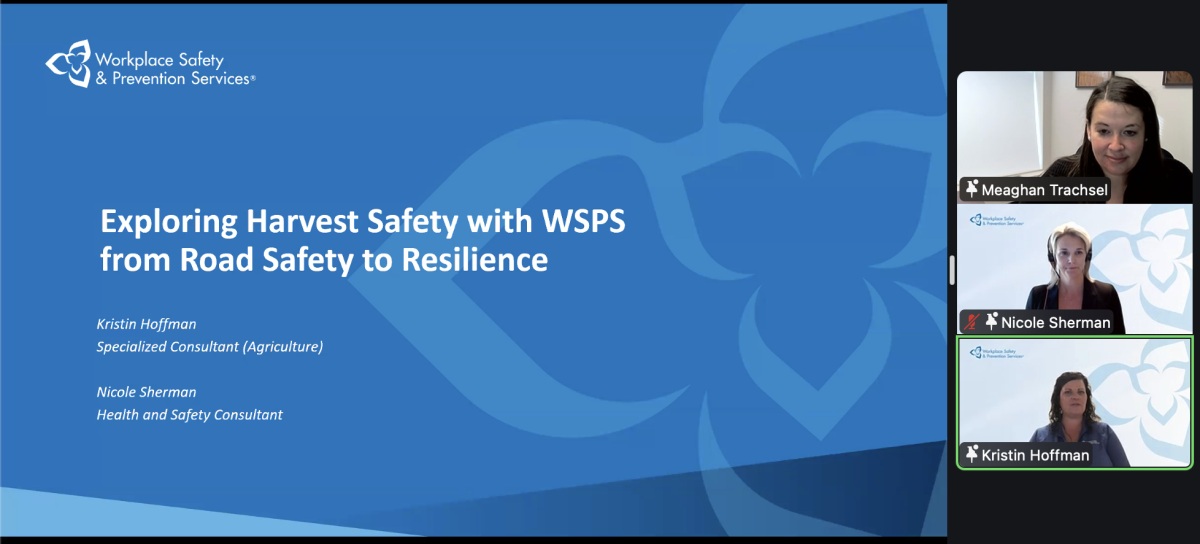Canadian biofuel processors expecting production incentives through the federal ecoEnergy for Biofuels program now have more time to complete their construction work, but also must meet some new criteria.
The federal government on Dec. 14 bumped the construction deadline for funded projects to Sept. 30, 2012, from the previous deadline of March 31, 2011.
Also effective on Dec. 14, the program’s eligiblity criteria were split into two groups: “existing producers,” who are to be capable of making biofuels by March 31, 2010, and “new producers,” meaning those who won’t have biofuel on tap by March 31 but can prove an “advanced state of readiness.”
Read Also

Exploring Harvest Safety
Kristin Hoffman of WSPS explains measures for increased farm safety around harvest season
Previously, the same eligibility criteria applied to all applicants.
Biofuel industry stakeholders were informed of program changes on Dec. 14 and were asked to express by Monday (Dec. 21) their intention to participate in the program under the new rules, the government said.
Stakeholders at that time were also asked to self-identify whether they’re “new” or “existing” producers.
Program administrators will contact all those who express an interest in participating in the program and “fully explain the process moving forward,” the government said on the ecoEnergy program website.
Payment rates
The ecoEnergy program’s design now also includes a new rate of incentive payments to processors, the government said. Previously, from the program’s launch in April 2008, processors were to receive a variable incentive rate, to be paid quarterly based on “market conditions.”
As of last week, however, and retroactive to April 1, 2008, the program will pay a “fixed, declining” incentive rate with monthly payments.
Also, where no one company would previously get an ecoEnergy incentive on volumes any higher than 30 per cent of the program’s total eligible volumes, that rule now applies only to renewable alternatives to gasoline. A 30 per cent “monetary-based” cap will instead apply to biodiesel production.
Furthermore, where the program previously assessed and approved incentive applications in the order in which projects are deemed complete, the ecoEnergy program will now follow “merit-based assessment” criteria for “new producers.”
Those “merit-based” criteria for new producers are to include the applicants’ “general financial position,” including total funding required and working capital available; their debt:equity ratios; their confirmed sources of financing and the “quality” of financing; and viability of both the applicant and the applicant’s parent company, based on audited financials.
The merit-based criteria will also be based on projects’ state of readiness, such as its sources of fuel feedstock, state of construction work and the reliability of the technology.
Projects also must meet environmental requirements, and plant management must have a certain level of experience. Contractual arrangements for the sale of fuel will also be considered, as will a project’s local and regional economic impact and its “long-term viability.”
Lastly, where the program’s overall funding profile was previously based on demand projections set before the program launch, its funding will now be reallocated to “better align funds to the actual volumes expected for the remaining years of the program.”
Pound-Maker
The revised program rules took effect three days before the Pound-Maker Agventures ethanol facility at Lanigan, Sask. was granted its previously pledged funding.
The Pound-Maker plant, which now has a nameplate production capacity of 15 million litres of ethanol per year, was approved Dec. 2, 2008 under the program and will now begin receiving its ecoEnergy incentive, worth up to a total of $8.4 million.
“This commitment from the government of Canada, coupled with support from provincial governments, will ensure that the economic benefits of ethanol production will continue to accrue to stakeholders in rural communities like ours,” Pound-Maker Agventures president Brad Wildeman said in the federal government’s release last Thursday (Dec. 17).
“These include shareholders, employees, grain producers and communities that look to projects like ours to remain viable by providing meaningful jobs and local market opportunities,” said Wildeman, who’s also president of the Canadian Cattlemen’s Association.
Pound-Maker has operated a cattle feedlot at Lanigan since 1970 and built an ethanol plant at the site in 1991. Both facilities have since expanded their capacity.














